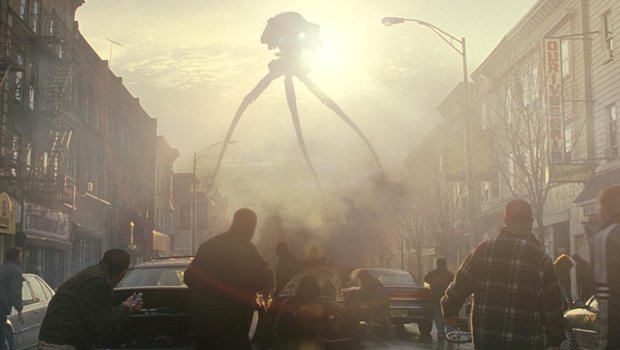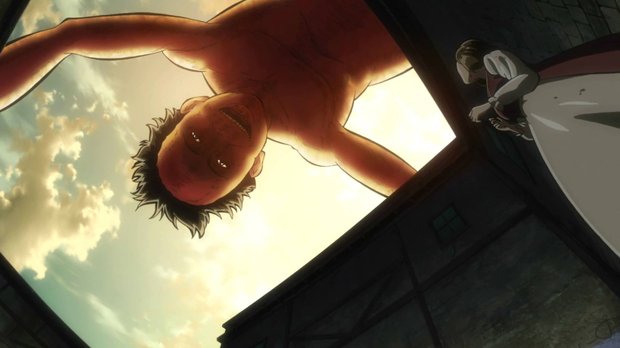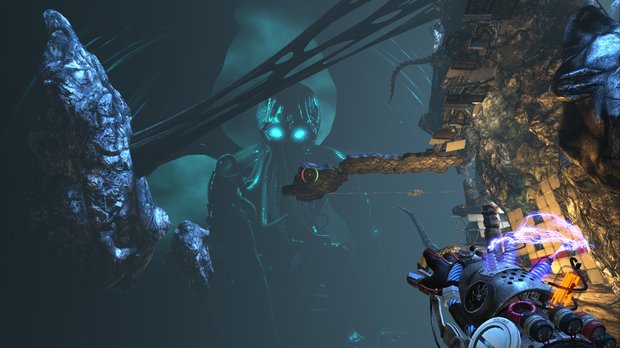You know what first-person horror needs? Unstoppable giants
Imagine actually seeing Godzilla. Feeling the ground rumbling beneath your feet. Watching as skyscrapers bend like pipe cleaners in the gigantic beast's grip. Staring up at a colossal being, utterly powerless to fight back. Knowing that, whether you hide under your bed or run faster than you've ever run in your life, you'll never get to safety in time. In my mind, that's the scariest thing imaginable: spotting a catastrophe in the distance--be it a tidal wave, a raging hurricane, the blast of a nuclear bomb, or a huge rampaging creature--and realizing that it's only a matter of time before it consumes me. It's a fear I'd only want to face in a video game, but it seems like most horror game developers are preoccupied with threats that can fit through the average doorway. Why isn't there a game that lets me flee screaming from a giant monster?

Blame Slender and Amnesia: The Dark Descent. The horror genre has gone through quite the renaissance over the last couple of years, shifting from the third-person perspectives of Resident Evil or Silent Hill to the kind of terrifying immediacy that's only possible via the literal in-your-face scares of first-person. There are plenty more great examples of first-person horror--SCP Containment Breach, One Late Night, or Eyes, to name a few--but they all operate on the same basic principles. You're exploring an abandoned, vaguely familiar environment, knowing full well that something out there wants you dead, yet you have no way of defending yourself beyond running and hiding. It's the perfect system to elicit fear, where feelings of helplessness and vulnerability regularly spring up out of gameplay. But it might be too effective--because it seems like the sub-genre has gotten stuck in a powerless-exploration rut.
It's been three years since Amnesia blew up, and we're still rehashing the same basic design elements. Outlast is the most recent culprit, with Daylight and Alien: Isolation on the way; all these games have the potential to offer incredible scares, but they're still just playing off a well-established core concept. Tip-toeing through claustrophobic environments, dimming light source clutched tightly in hand, hoping that you don't stumble into supernatural danger--it's only entertaining so many times. But make the otherworldly menace gigantic, and suddenly the increasingly stale first-person horror model becomes fresh again.

I can see it now: a crumbling cityscape, ground zero for the arrival of a creature who equals the Stay Puft Marshmallow Man or the Cloverfield monster in size. To this behemoth, you are nothing--a speck of flesh and bone that could be crushed underfoot in an instant. Weapons are useless; neither bullets nor rockets can pierce the giant's hide. Most of the population's been evacuated (so no need to render huge crowds of panicked citizens), but you've stuck around--maybe to rescue your family members on the other side of the city, or find the origin of this titanic menace so you can one day learn to defeat it. Bonus points if the monster has a deafening, guttural roar a la Godzilla.
And the technology's all there to actually bring such a terrifying sight to life. Picture skyscrapers that actually fall to pieces, akin to the centerpiece of Battlefield 4's Siege of Shanghai map. Imagine levolution on a citywide scale, where 50-foot buildings crumble into one another like giant metal dominoes as a behemoth tail-swipes them aside. You know what would really put it all over the top? Oculus Rift support, letting you actually feel the physical tension as your neck cranes to look up at the underbelly of this fearsome titan.
The scenario sounds daunting to create, but I feel like plenty of games have already succeeded at creating this kind of terror--just not in a survival horror sense. First-person shooters often make you square off against creatures 500 times your size, but for my money, no FPS has done this better than Killzone 3's fight against the MAWLR. It's an enemy so gargantuan, so shockingly colossal in scale, that just looking at it made me feel a tinge of despair. The MAWLR is awesome, in the old-school sense of the word: imposing, breathtaking, frightening. But all that suspense and fear melts away when you actually start shooting at it.
Big enemies in shooters all suffer from the same shortcoming: an implausible frailty in the face of a single super-soldier. The Kraken from Legendary (man, what a poorly named game) is especially guilty of this: Here's an enormous creature of myth that can crush clock towers with a single tentacle--yet it reels in pain when you fire a homing rocket into its open maw. And the havoc it wreaks isn't particularly convincing, restricted to canned animations that always destroy property with the same rehearsed motions. The MAWLR fight in Killzone, the bosses of Dead Space, the Leviathan of Resistance 2--they all boil down to shooting the bright orange weak points with rockets, rinse and repeat until dead. This design reduces such mammoth enemies to little more than a set of extra-large bull's-eyes, trivializing the scale of the encounter almost entirely.
Sign up to the GamesRadar+ Newsletter
Weekly digests, tales from the communities you love, and more
So has anyone actually nailed the experience of standing helpless before a colossal menace? I think so--a rather unlikely trio of indie games, two of which aren't even in first-person. First is Knock-knock, an insomnia-based psychological horror explorer set in your ever-shifting house and the forest it resides in. Late into the game, you'll zoom out the camera to reorient yourself--only to see a hideous, mile-tall creature standing above the treeline, bearing down on your home. It's a scare unlike any seen before that point, and the sheer size of your frightening hallucination(?) is enough to make you jump. The same basic scenario is done much more subtly in Canabalt, where giant killer robots are seen lurching and laser-beaming victims in the distance. When your nameless runner inevitably hits a wall and plummets to his death, the game suggests that you "Jump to retry your daring escape." But your attempts at escape are futile, because no amount of sprinting will get you out of the city before it's decimated by these towering machines.

But the most impressive example of giant terror comes from a game I don't even recommend: Magrunner. This Portal-style first-person puzzler uses magnetism as its primary gimmick, but the story's fairly unique, revolving around a futuristic corporation that secretly worships Lovecraftian gods and decides to make you their emissary. Most of the game takes place in a training facility, but the finale sends you to an extra-dimensional temple floating through space. And the first thing you see is Cthulhu himself, looming over you larger than anything I've ever seen in a first-person game. You don't even interact with the Great Old One, let alone fight him. You simply stare in awe as he stares back, making you feel like an insignificant grain of sand in a universe you have no control over. It's pretty incredible--and watching it on YouTube spares you the headache of playing through the earlier levels.
I find myself craving a new kind of fear in video games--fear of the unfathomable, which takes a form infinitely larger than our own. And that sensation of defenselessness at the feet of an enormous monster is what first-person horror games could gloriously offer, if only they'd try. No matter how creepy Slender Man may be up close, he'll always look like a silhouetted Mr. Rogers from a distance. And really, what's scary about that?
Lucas Sullivan is the former US Managing Editor of GamesRadar+. Lucas spent seven years working for GR, starting as an Associate Editor in 2012 before climbing the ranks. He left us in 2019 to pursue a career path on the other side of the fence, joining 2K Games as a Global Content Manager. Lucas doesn't get to write about games like Borderlands and Mafia anymore, but he does get to help make and market them.



